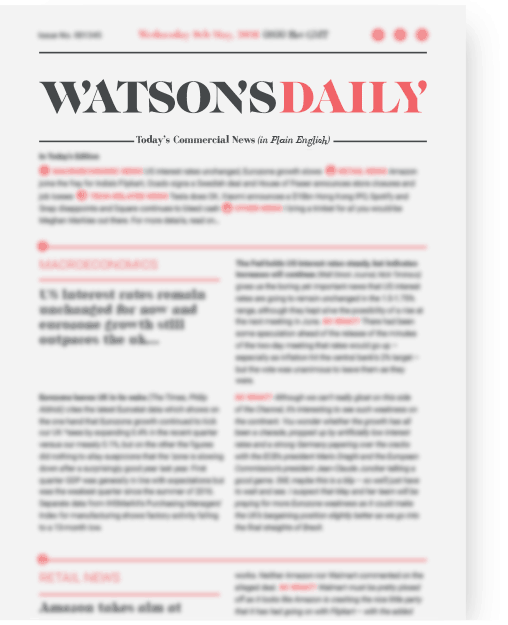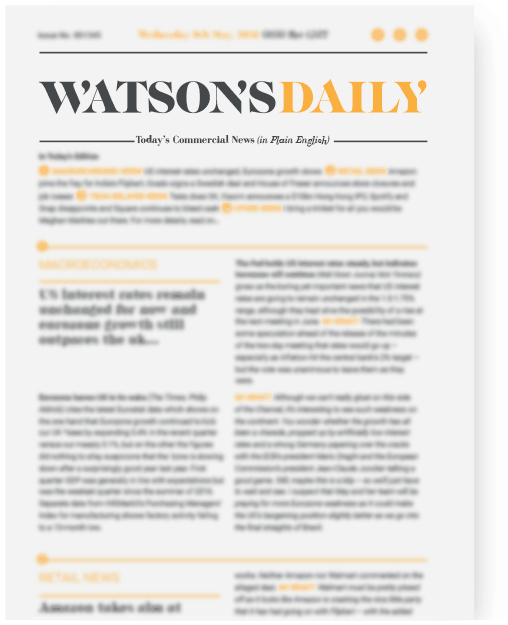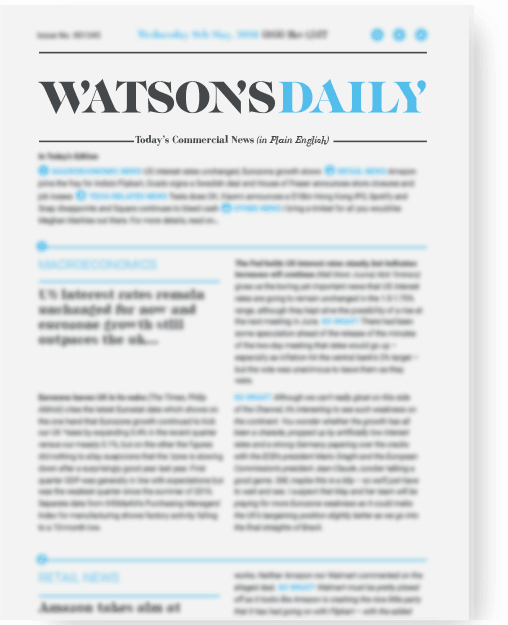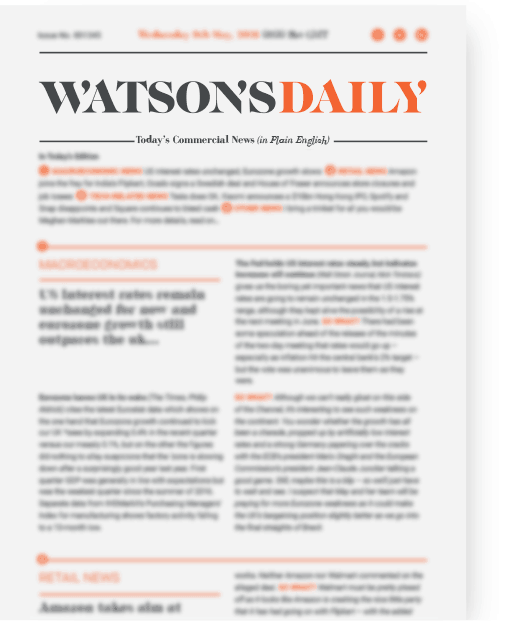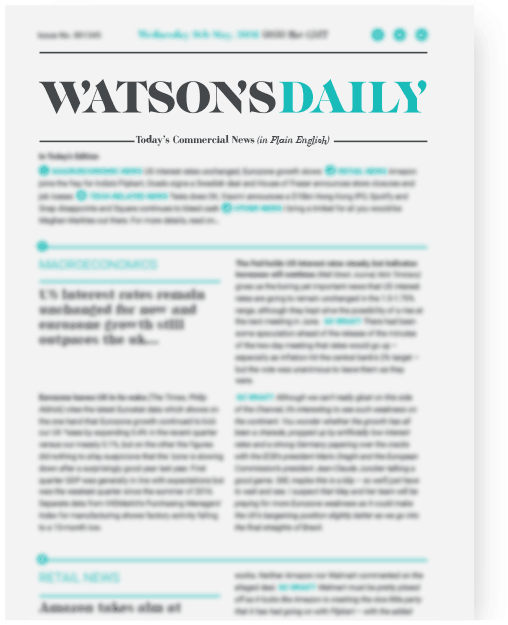- In CORONAVIRUS NEWS, markets continue to fall, Italy and UK warn on effect on budgets, China’s data is questioned as the race for a vaccine continues and spice prices go up
- In RETAIL NEWS, Amazon opens a supermarket, Home Depot does OK, UK retailers show lower sales but higher optimism and Tesco cuts in-store bakery jobs
- In INDIVIDUAL COMPANY NEWS, Expedia cuts 12% of its workforce and Disney’s boss resigns suddenly
- In OTHER NEWS, I bring you the lasagne-in-a-pizza and nuts that aren’t…
1
CORONAVIRUS NEWS
So markets weaken, Italy and UK warn on budget impact, China’s data is questioned, the race for a vaccine continues and spice prices rise…
Virus fears send stocks down again (The Times, Callum Jones, James Dean and Tom Howard) highlights further weakness in world stock markets as the coronavirus has now spread (officially) to 34 countries. According to the World Health Organisation, 80,000 people have been infected and 2,700 have died so far. Italy warns EU on budget targets as coronavirus cases rise (Financial Times, Miles Johnson, Myles McCormick and Daniel Dombey) shows that Italy is managing down expectations as its industrialised northern regions are suffering from coronavirus impact whilst the economy is already on the verge of recession and Weak economy and coronavirus threaten UK spending pledges (Financial Times, Chris Giles and George Parker) shows that new Chancellor Rishi Sunak may have to rein in some of the government’s biggest Budget decisions until the autumn given the likely negative impact of the coronavirus on the economy. The Budget will go ahead as planned on March 11th, but officials are talking about a “trilogy” of statements this year.
Meanwhile, China fall in coronavirus cases undermined by questionable data (Financial Times, Yuan Yang, Nian Liu and Tom Mitchell) highlights scepticism surrounding the recent apparent fall in the number of new coronavirus cases outside of Hubei, the province from which the virus originated. The problem is that the numbers have fluctuated wildly depending on how individuals are diagnosed and the authorities seemed to have flipped between different methods, causing a mix of confusion, panic and now scepticism. Still, the hunt for a vaccine continues. Drug firms rush to find vaccine but don’t expect to profit by it (The Times, Alex Ralph) highlights the ongoing efforts by big pharmaceuticals companies to find a vaccine but also that they aren’t expecting to make tons of money from it. Although short term investors are pushing up share prices of biotech companies and mask/glove-makers, they maintain that they are NOT going
to make any money from finding a cure. Still, I guess that the companies will win brownie points that they may well use further down the line…
Why coronavirus is driving up the price of spice (Financial Times, Emiko Terazono) is a really interesting article which highlights that wholesale prices of garlic, ginger and chilli have gone up by 17% since the start of December because of labour shortages in farms and distribution. * SO WHAT? * China accounts for about 80% of the global garlic export market, 47% of the ginger market and 20% of the chilli market, according to figures published by research firm Mintec. Even where production is returning to normal, there have been container ship shortages and higher freight costs. Bad news for stir fry fans (and I include myself in this)!
*** RANT ALERT *** Just thought I’d warn you that I’m about to have a mini-rant. I don’t know how many of you pay attention to this, but do you look at the table at the bottom of Watson’s Daily? It’s got all the market levels, currencies etc. Anyway, three things – firstly, the oil price is getting mullered at the moment. SURELY Opec are going to have to cut production levels to stop a downward spiral in price. Secondly, have you noticed how suspiciously well the Shanghai stock market has been performing while other markets have been all over the place during this coronavirus outbreak? The Chinese must be throwing LOADS of cash at the market to prop it up. When/if they stop buying, the market level is going to get a massive dose of reality. OK, so China has loads of money to be able to do this, but the market must feel like a money pit at the moment…and THIRDLY, what’s going on with Bitcoin?? It has supposedly turned into a “safe haven” asset like gold (yes, weird I know given it has no intrinsic value) and yet, gold continues to strengthen while Bitcoin shows more volatility. I’ve said it before and I’ll say it again, I have NEVER seen a convincing explanation as to why Bitcoin moves. All that cr*p about “oh, big buyers in China” or some such rubbish that traders use by way of “explanation” is just hot air. I’ve worked with these people and I know the sort of answers they give when they haven’t got a clue/can’t be ars3d 😂. You can explain other currency moves on political/economic impact but Bitcoin is just bizarre! Rant over 😁. I feel better now…
2
RETAIL NEWS
Amazon opens a supermarket, Home Depot does OK, there’s good and bad for UK retailers and Tesco announces job cuts…
Amazon opens cashierless supermarket in latest push to sell food (Wall Street Journal, Sebastian Herrera and Aaron Tilley) heralds a new chapter for cashierless shops as Amazon.com just used the technology from its “Go” stores in a new larger format of a supermarket! Amazon Go Grocery opened in Seattle yesterday and uses a combination of cameras, shelf sensors and software to ensure shoppers pay for what they take away! Accounts are normally charged via a smartphone app when you leave the store. Amazon has opened a number of “Go” convenience stores since 2018, but this latest store is five times bigger than the format in its existing 25 stores. The company will be using this a a way to showcase the technology to potential partners. * SO WHAT? * Sounds pretty amazing, right? It’s interesting to see that they are apparently open to other traditional retailer rivals using their tech (for a fee, obviously), but then there will be some who will be scared of working with a massive rival – plus there are bound to be loads of issues about data privacy etc. I do wonder with this sort of thing whether it really is viable long term when you pitch installation/ongoing maintenance costs (and surely at least some losses from shoplifters!) versus just doing things the old-fashioned way.
Home Depot’s quarterly profit rises (Wall Street Journal, Dave Sebastian) shows that the US home improvement
chain did well in the latest quarter but may suffer coronavirus impact as it sources 30% of its products from overseas, mainly from China. * SO WHAT? * Given that it is a large home improvement store, Home Depot is often seen as an indicator of economic confidence. Either people are moving house more often or they are spending money anyway on upgrading their existing homes. Either way they are spending money – and that’s what the economy needs!
In the UK, there’s a mixed picture for retailers as Mixed bag for high street sales (The Times, Gurpreet Narwan) says that retail sales growth in February fell short of expectations according to the latest figures from the CBI but then Retailers to unleash investment spending spree (Daily Telegraph, Tim Wallace) concentrates on a different aspect of the same report that says that more retailers are planning to invest than cut back. The swing in investment in investment intentions was the biggest since records began in 1983 and would suggest that a feelgood factor may be returning.
Unfortunately, the feelgood factor is likely to be in short supply in Tesco puts 1,800 jobs at risk as it scales down in-store bakeries (The Guardian, Joanna Partridge) as the supermarket says that it is having to make the cuts because of changing consumer tastes. They are buying more wraps, bagels and flatbreads in preference to the humble traditional loaf and Tesco wants to adapt. This comes only a year after the supermarket said it would close fresh food counters in about 90 of its stores and cut head office roles. * SO WHAT? * Although Tesco blames the move on changing consumer tastes, it’s probably more likely that the company just wants to cut costs and protect margins in the face of the German discounters who are constantly snapping at their heels!
3
INDIVIDUAL COMPANY NEWS
Expedia cuts 12% of its workforce and Disney loses its CEO suddenly…
Expedia cuts 3,000 jobs in major restructuring (Financial Times, Alice Hancock) highlights major changes at the online travel agency following the departures of its chief exec and CFO in December. 500 of the jobs being cut will be at its Seattle HQ. Chairman Barry Diller said that “We are stopping doing dumb things and starting doing what we think are good things”. * SO WHAT? * Expedia compares unfavourably to rival Booking.com and is also suffering from the recent entry of Google into the online travel sector. Tough times.
In Disney CEO Bob Iger steps aside; Bob Chapek named new head (Wall Street Journal, R.T Wilson, Joe Flint and Ben Fritz) we see that longtime CEO Bob Iger announced the surprise decision to step away from being Disney’s CEO and promote its head of parks and resorts to the top job. Iger will stay on as deputy chairman until the end of next year. Iger presided over a transformative period in Disney’s history and has been highly regarded. Under his tenure, Disney’s share price has increased six-fold, its annual net income has more than quadrupled and its annual revenue has more than doubled. Not bad!
4
OTHER NEWS
And finally, in other news…
Many of you will know by now that I am intrigued by unusual food. Well how about this beauty: Hungry Horse pubs are selling a lasagne inside a pizza – and it looks epic (The Mirror, Courtney Pochin https://tinyurl.com/rtpf7pe). WHAT???????????? It sounds pretty tragic to me. Apparently, they are catering to that massive cohort of diners who can’t quite decide on whether they want pizza or lasagne 😂. We’ve all been there (not). Staying on the food theme, I thought this was interesting: 10 ‘Nuts’ That Aren’t Actually Nuts (Mental Floss, Mark Mancini https://tinyurl.com/vqabh5a). Well I never!
Some of today’s market, commodity & currency moves (as at 0724hrs green is up, red is down). THIS IS INTENDED AS A ROUGH GUIDE ONLY!
| FTSE 100 * | Dow Jones * | S&P 500 * | Nasdaq** | DAX * | CAC-40 * | Nikkei ** | Shanghai ** |
| 7,018 (-1.94%) | 27,081 (-3.15%) | 3,128 (-3.03%) | 8,966 | 12,790 (-1.88%) | 5,679 (-1.92%) | 22,426 (-0.79%) | 2,986 (-0.89%) |
| Oil (WTI) p/b | Oil (Brent) p/b | Gold Per t/oz | £/$ | €/$ | $/¥ | £/€ | $/₿ |
| $49.8338 | $54.7075 | $1,642.53 | 1.29820 | 1.08691 | 110.39 | 1.19441 | 9,159.19 |
(markets with an * are at yesterday’s close, ** are at today’s close)





